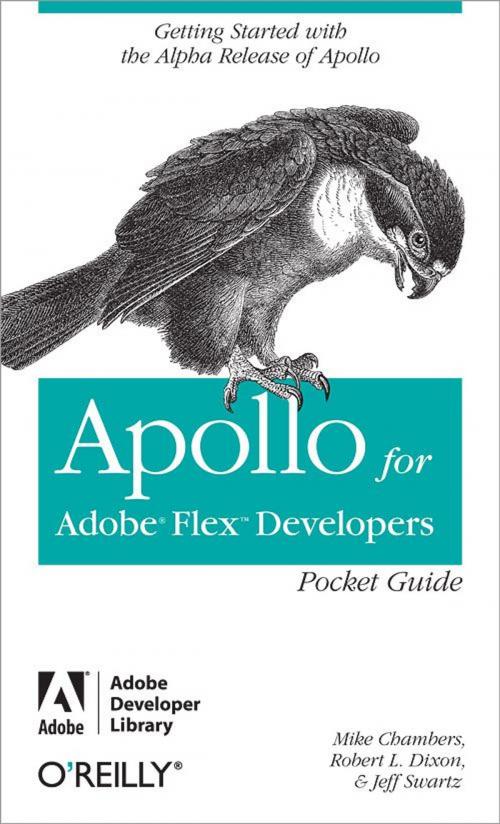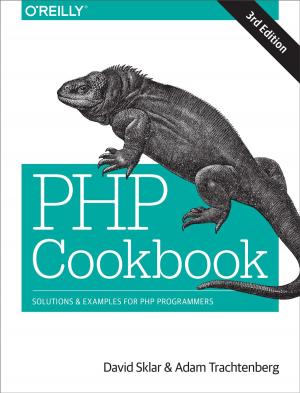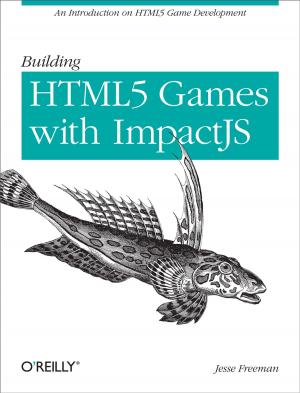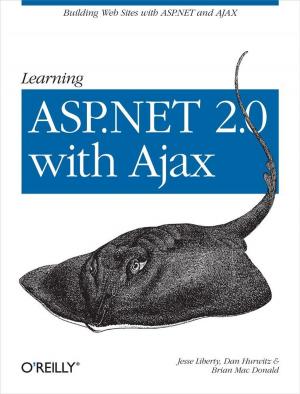Apollo for Adobe Flex Developers Pocket Guide
A Developer's Reference for Apollo's Alpha Release
Nonfiction, Computers, Internet, Web Development, Web Site Design, Programming| Author: | Mike Chambers, Rob Dixon, Jeff Swartz | ISBN: | 9780596551643 |
| Publisher: | O'Reilly Media | Publication: | March 9, 2007 |
| Imprint: | Adobe Developer Library | Language: | English |
| Author: | Mike Chambers, Rob Dixon, Jeff Swartz |
| ISBN: | 9780596551643 |
| Publisher: | O'Reilly Media |
| Publication: | March 9, 2007 |
| Imprint: | Adobe Developer Library |
| Language: | English |
Written by members of the Apollo product team, this is the official guide to the Alpha release of Adobe Apollo, the new cross platform desktop runtime from Adobe Labs.
Apollo for Adobe Flex Developers Pocket Guide explains how to build and deploy Flash-based Rich Internet Applications (RIAs) to the desktop using Adobe's Flex framework. This book describes concisely how Apollo works, and offers numerous examples for those who want to start building RIAs for the desktop right away.
Why put RIAs on the desktop? They're already supposed to offer the responsiveness of desktop programs. Unfortunately, web browsers were designed to deliver and display HTML-based documents, not applications. The conflict between document- and application-focused functionality creates several problems when deploying applications via the browser.
Adobe Apollo gives you the best of both worlds -- the web development model and true desktop functionality. This pocket guide explains how to:
- Set up your development environment
- Create your first application
- Use the File I/O API
- Use HTML within Flex-based Apollo applications
- Use the included Apollo mini-cookbook for common tasks
The book also includes a guide to Apollo packages, classes, and command-line tools. Once you understand the basics of building a Flex-based Apollo application, this pocket guide makes an ideal reference for tackling specific problems.
Adobe Developer Library is a co-publishing partnership between O'Reilly Media and Adobe Systems, Inc. and is designed to produce the number one information resources for developers who use Adobe technologies. Created in 2006, the Adobe Developer Library is the official source for comprehensive learning solutions to help developers create expressive and interactive web applications that can reach virtually anyone on any platform. With top-notch books and innovative online resources covering the latest in rich Internet application development, the Adobe Developer Library offers expert training and in-depth resources, straight from the source.
Written by members of the Apollo product team, this is the official guide to the Alpha release of Adobe Apollo, the new cross platform desktop runtime from Adobe Labs.
Apollo for Adobe Flex Developers Pocket Guide explains how to build and deploy Flash-based Rich Internet Applications (RIAs) to the desktop using Adobe's Flex framework. This book describes concisely how Apollo works, and offers numerous examples for those who want to start building RIAs for the desktop right away.
Why put RIAs on the desktop? They're already supposed to offer the responsiveness of desktop programs. Unfortunately, web browsers were designed to deliver and display HTML-based documents, not applications. The conflict between document- and application-focused functionality creates several problems when deploying applications via the browser.
Adobe Apollo gives you the best of both worlds -- the web development model and true desktop functionality. This pocket guide explains how to:
- Set up your development environment
- Create your first application
- Use the File I/O API
- Use HTML within Flex-based Apollo applications
- Use the included Apollo mini-cookbook for common tasks
The book also includes a guide to Apollo packages, classes, and command-line tools. Once you understand the basics of building a Flex-based Apollo application, this pocket guide makes an ideal reference for tackling specific problems.
Adobe Developer Library is a co-publishing partnership between O'Reilly Media and Adobe Systems, Inc. and is designed to produce the number one information resources for developers who use Adobe technologies. Created in 2006, the Adobe Developer Library is the official source for comprehensive learning solutions to help developers create expressive and interactive web applications that can reach virtually anyone on any platform. With top-notch books and innovative online resources covering the latest in rich Internet application development, the Adobe Developer Library offers expert training and in-depth resources, straight from the source.















